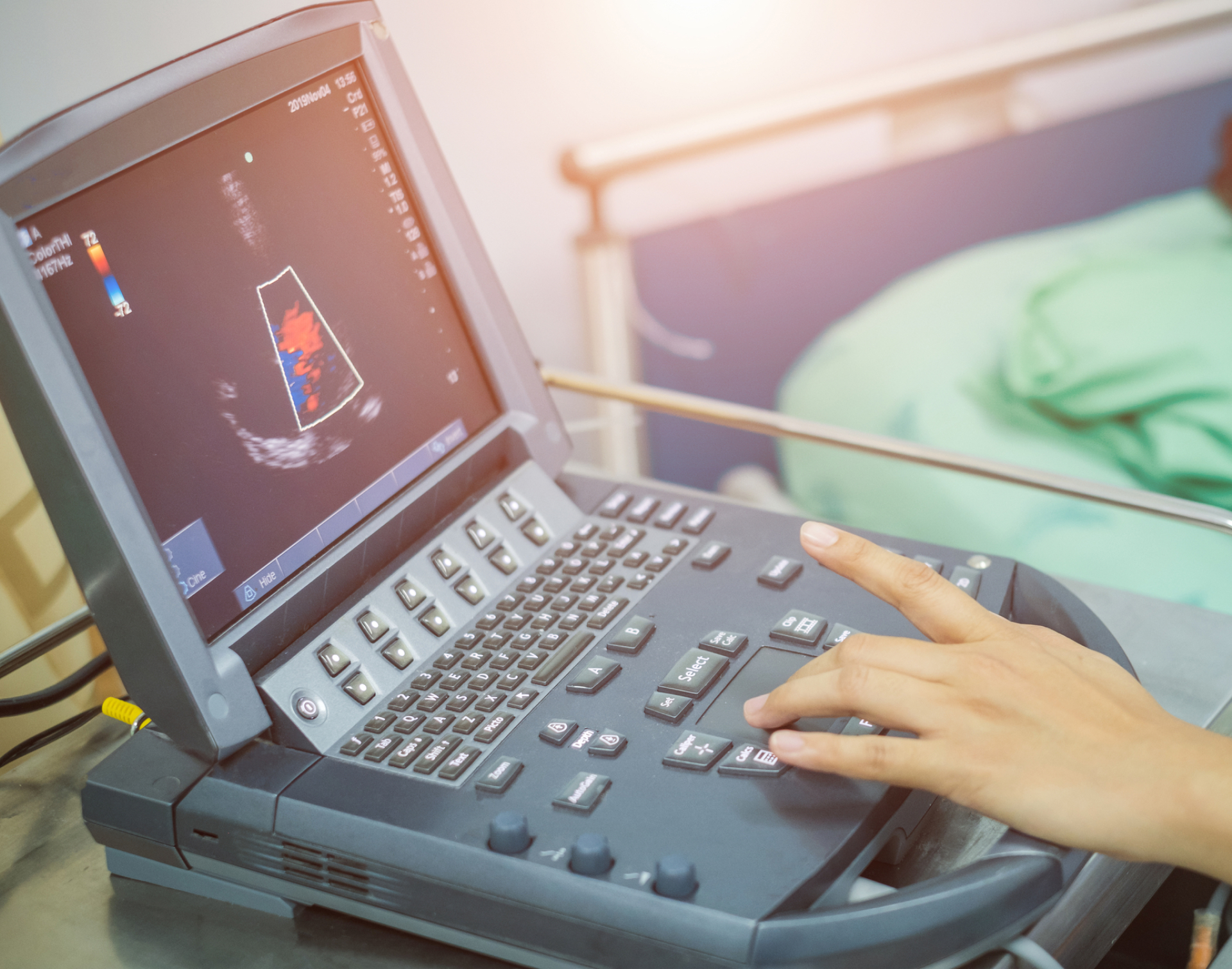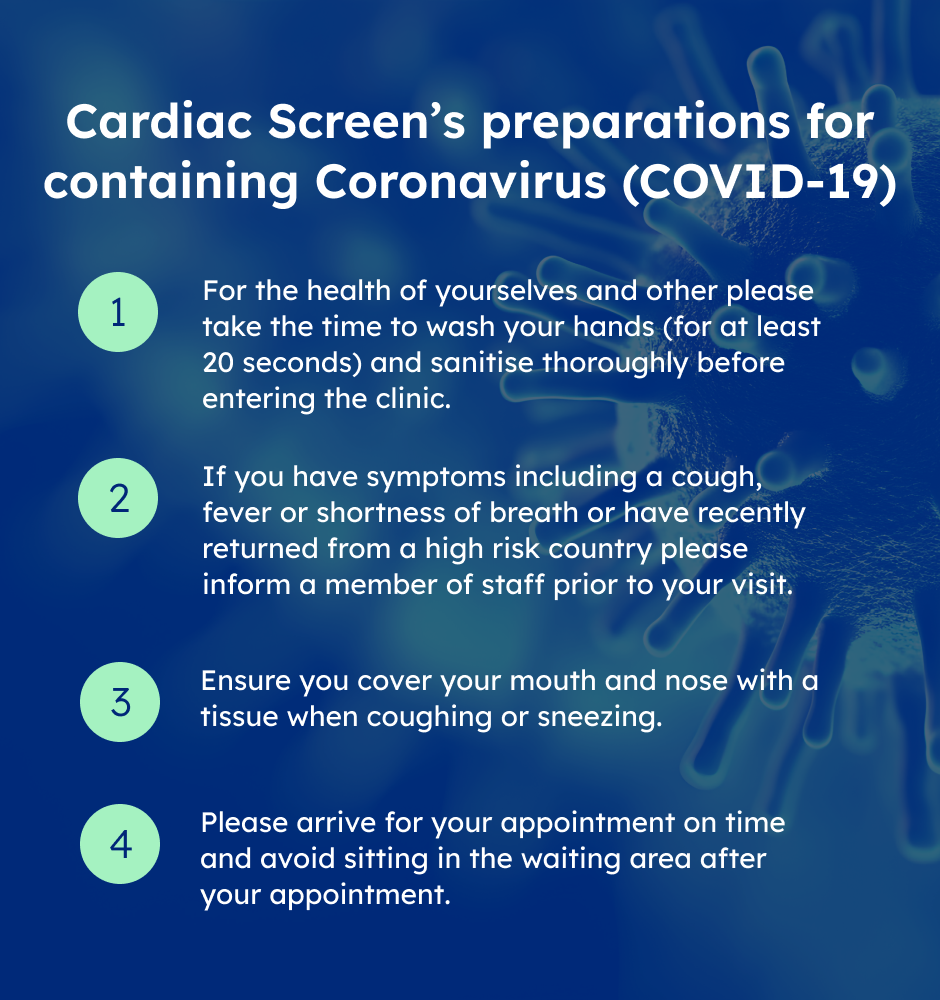Please click here to view Cardiac Screen's preparations for containing Corona Virus
Balppa House, 57-61 Newington Causeway, London SE1 6BD
Complete Heart Screening
A consultation with a cardiologist
A consultation with a cardiologist
Resting Electrocardiogram (ECG)
When you have a resting ECG, you will be asked to lie down and relax for about five minutes. During this time, a series of electrodes, attached to your skin with small sticky pads, will be recording the electrical activity going on in your heart. The electrodes are just recording devices, which can’t send out any electrical impulses of their own, so you won’t feel a thing. The information they gather is transmitted back to the ECG machine, which will produce a chart or electrocardiogram showing how the electrical activity changes over time.
Exercise Treadmill ECG
Evaluates the electrical activity of the heart, blood pressure and heart rate with exercise. It is a useful test to detect coronary artery disease (any blockages of the heart arteries) and response of heart rate or any electrical heart disturbances of the heart rhythm & blood pressure response to exercise. Please bring along with a pair of running shoes and jogging pants/shorts for the treadmill ECG. The test takes approximately 30 minutes. The exercise test is carried out by using the Bruce Protocol. The Bruce protocol is a standard test in cardiology and is comprised of multiple exercise stages of three minutes each. At each stage, the gradient and speed of the treadmill are elevated to increase work output, called METS. Stage 1 of the Bruce protocol is performed at 1.7 miles per hour and a 10% gradient. Stage 2 is 2.5 mph and 12%, gradient while Stage 3 goes to 3.4 mph and 14% gradient , Stage 4 goes to 4.2mph and a 16%gradient , Stage 5 does to 5mph and a 18% gradient ..
Echocardiogram (Ultrasound of the heart):
Evaluates the heart structures by the use of ultrasound, or high frequency sound wave, which creates graphic images of the heart. The primary role of echocardiography in clinical practice is a non-invasive and costeffective answer to the structure and function of the heart muscle and valves. There is no preparation required for the test, it takes approximately 20-30 minutes and is painless. The Echocardiogram measures the Left Ventricular Ejection Fraction (LVEF) which is a measurement of the percentage of blood leaving your heart each time it contracts.
Cardiovascular risk profile
- Cholesterol: Measure the risk of cardiovascular disease, the lower the cholesterol value gets, the lower the risk of cardiovascular disease.
- HDL Cholesterol : Measures 'good cholesterol' that helps protect from heart disease.
- LDL Cholesterol: Measures 'bad cholesterol' that collects in the walls of blood vessels, causing the blockages of artery.
- Triglycerides: important to human life and are the main form of fat in the body and are used to provide energy to the body. High triglyceride levels have been linked to a greater chance for heart disease and diabetes.
General Chemistry blood Profile, which includes
- The Kidney /Renal Profile consist of: (Sodium, Potassium, Chloride, Urea, Creatinine, Bicarbonate and estimated GFR)
- The Liver function Profile consists of: (Alkaline Phosphate, Alanine Aminotransferase, Aspartate Aminotransferase, Total Protein, Bilirubin and Albumin)
- Fasting Blood Glucose (Sugar): for Diabetes
- C Reactive Protein (CRP): Blood test to identify inflammation or infection in the body.
Total/ Whole/ Full Blood Count
Blood test to determine general health status and to screen for a variety of disorders, such as anaemia and infection, inflammation nutritional status and exposure to toxic substances. This consists of:
- White cell count
- Red cell count
- Haemoglobin
- HCT
- MCV
- Differential count
- Platelets
Thyroid profile
Blood test to check for a raised TSH level indicating a “lazy” thyroid gland. This consists of :
- TSH
- FT3
- FT4
Routine Urine
identifies and measures some of the by-products of normal and abnormal metabolism, cells, cell fragments, and bacteria in urine. Urine is produced by the kidneys, which filter wastes out of the blood, help regulate the amount of water in the body, and conserve proteins, electrolytes, and other compounds that the body can reuse. Anything that is not needed is excreted in the urine
Vitamin D
is actually a hormone produced by the skin. It plays a part in bone health and can be a determinant factor in developing many diseases because of its role in inflammation. Vitamin D’s involvement in calcium and phosphorus uptake and absorption also make vitamin D a major component of nervous system functioning.
Prostate Profile (PSA)
The PSA test stands for Prostate-Specific Antigen test. It checks a blood sample for the level of PSA, a substance produced by the prostate gland. If the PSA test detects a higher than normal value (above 4.0ng/ml) it may indicate prostate infection, enlargement of the prostate gland, or cancer
If you suffer from palpitations then you will require either a 24/48/72/144 hours ambulatory ECG or a cardiac Event monitor for either one –two weeks depending on how frequent and what type of symptoms for the palpitations you have.
Ambulatory ECG (£350 and £75 for every additional day)
An ambulatory electrocardiogram (EKG or ECG) records the electrical activity of your heart while you do your usual activities. For this test, you wear a lightweight, battery-operated tape recorder (monitor). It attaches to a strap that goes round your neck or around your waist. The recorder is connected by wires to small pads or patches (electrodes) taped to your chest. These detect the electrical signals from your heart. It will record any abnormal heart rhythm /Palpitations or any arrhythmias. No preparation is required for the test. You will be connected to the machine for 24-144 hours and you can remove it whilst having a bath or shower and thereafter reconnect in back on.
Ambulatory Blood Pressure Monitoring (ABPM)(£350.00)
is when your blood pressure is being measured as you move around, living your normal daily life. It is normally carried over 24 hours. It uses a small digital blood pressure machine that is attached to a belt around your body and which is connected to a cuff around your upper arm. It small enough that you can go about your normal daily life and even sleep with it on. The machine then takes blood pressure readings at regular intervals throughout the day: usually, every 15-30 minutes during the daytime and 30-60 minutes at night. You will need to keep the monitor on through the night – you could put the machine under the pillow or on the bed while you sleep. Because the test is being carried out to find out what your normal daily blood pressure is, it is important to carry on with your normal routine and do all the things you would normally do. The only things you should avoid doing for the day are swimming and having a bath or shower. At the end of the 24 hours you can remove the machine and cuff and give it back to the hospital or surgery. The machine will have stored all your readings and these will then be analysed.
Do you have a Question?
Pricing
From only £1,650.00
Complete Heart Screening Test is Available at a Special Reduced Rate!
Location
Complete Heart Screening is available at
The Medical Specialist
Balppa House
57-61 Newington Causeway
London
SE1 6BD
Appointments
Same Day Appointments
You can have quick access with same day appointments.
Self Referral
If you are self-referral, our staff would be happy to get a brief history of your symptoms and advise you appropriately with what you will require and which consultant you will need to be booked with.
Contact
Please contact us by clicking the button below, or speak directly to one of our dedicated Patient Care team directly on 020 7403 5294
Cardiac at Home Services
Our unique cardiac at home service means we come to you to perform this test in the comfort of your home.
Do You Qualify?Client Reviews

Price From only £1,650.00
Complete Heart Screening
A consultation with a cardiologist








 BOOK NOW
BOOK NOW 






